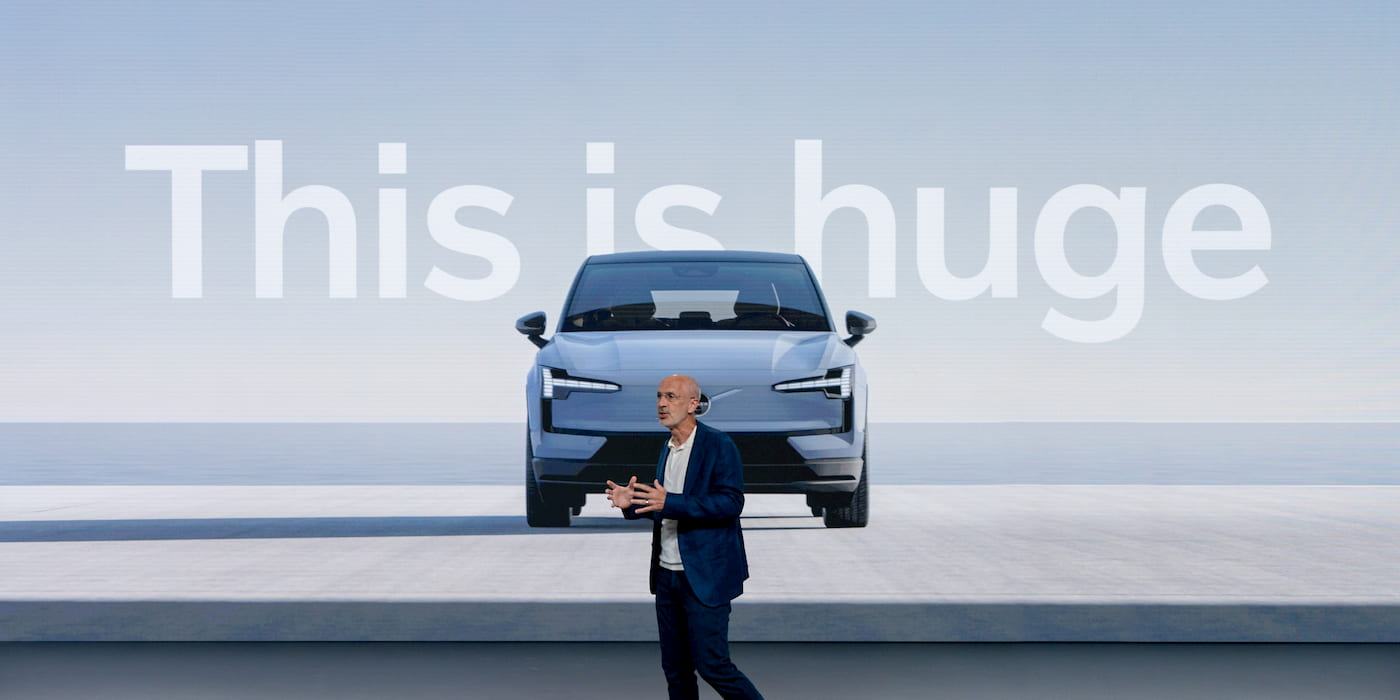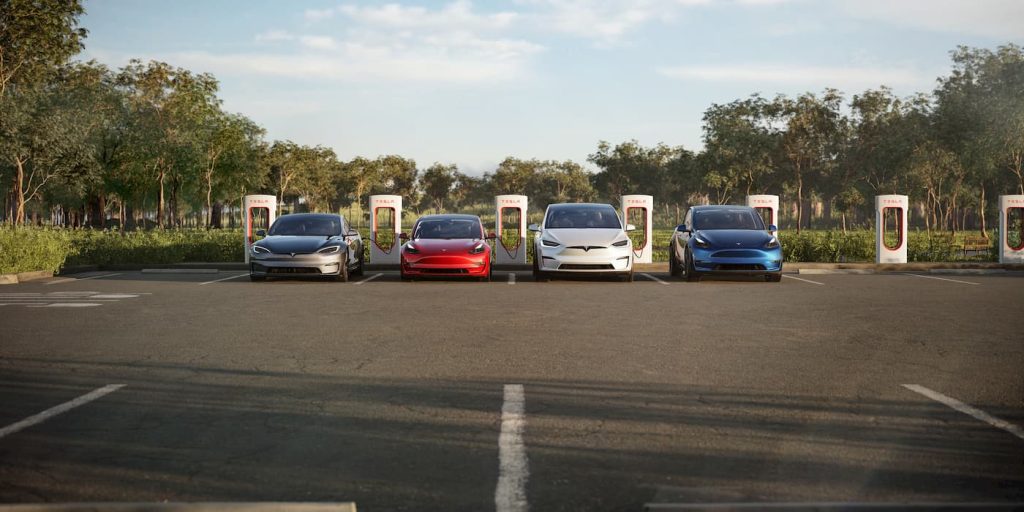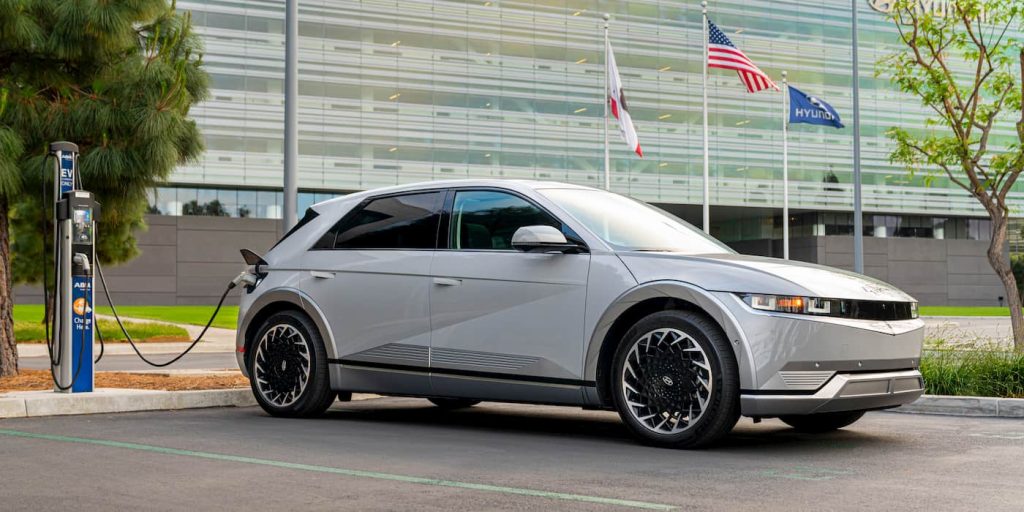
EV sales surged past 300,000 for the first time in the third quarter, a nearly 50% increase over last year. As automakers like Volvo, Mercedes-Benz, Nissan, and Hyundai ramp production, Tesla’s market share is slipping.
The latest quarterly EV sales estimates from Cox Automotive dropped Thursday, showing a record 313,086 electric cars sold from July to September. EV sales have now expanded for 13 straight quarters.
Electric vehicles accounted for 7.9% of total US auto sales in Q3, up from 6.1% a year ago and 7.2% in Q2.
EV sales surged 49.8% compared to last year, increasing 5% from the 298,039 sold in Q2. The data shows most automakers have picked up the pace significantly over the past year.
Volvo, Nissan, Mercedes-Benz, and Hyundai posted notable progress, with sales growing over 200%. The growth comes as new electric models hit the market. Over the past year, 14 new EVs have been introduced.
Higher inventory, more availability, and lower prices have also contributed to the growth. According to Cox Automotive, EV prices are down 22% over the last year, with a $50,683 average price paid in September.
The price cuts are led by Tesla, with prices down around 25% from last year. Last week, the Tesla Model 3 hit its lowest starting price ever at $38,880.

Tesla’s market share shrinks as US EV sales pick up
Although Tesla continues its dominant expansion, delivering over 435,000 cars in Q3 (+19.5% YOY versus industry average of 16.3%), the EV leader’s market share is slipping.
Tesla’s market share hit 50% in the third quarter, down from 62% in Q1 and its lowest so far. The highly anticipated Cybertruck could help turn things around, but the competition is still picking up.
Since Tesla pioneered the industry, losing market share as other automakers ramp up is inevitable. The gap is still massive at 50% of the market. (Check out these two charts for proof.)

Rivian delivered 15,564 electric vehicles in the quarter, up 126% from last year. GM began delivering the Chevy Silverado EV (although they only delivered 18 units), and Ford expects F-150 Lightning production to pick up by the end of the year.
Meanwhile, overseas automakers are beginning to make their presence known. Mercedes-Benz EV sales climbed 284% to reach 10,423 in Q3.
Although Ford (20,962) and GM (20,092) sold more electric models in the quarter, Mercedes topped the American automakers as a percent of total sales. Mercedes’s EV sales in the US reached nearly 15%, while GM and Ford are around 3% to 4%.
| Q3 2023 sales | Q3 2022 | YOY | Q3 Market Share | |
| Audi | 7,538 | 3,891 | 93.7% | 2.4% |
| BMW | 13,079 | 4,365 | 199.6% | 4.2% |
| BrightDrop | 35 | – | 0% | 0% |
| Cadillac | 3,018 | 36 | 0% | 1% |
| Chevrolet | 15,872 | 14,709 | 7.9% | 5.1% |
| Ford | 20,962 | 18,257 | 14.8% | 6.7% |
| Genesis | 1,802 | 888 | 102.9% | 0.6% |
| GMC | 1,167 | 411 | 183.9% | 0.4% |
| Fisker | 997 | – | 0% | 0.3% |
| Hyundai | 19,630 | 5,824 | 237.1% | 6.3% |
| Jaguar | 86 | 22 | 290.9% | 0% |
| Kia | 9,325 | 5,583 | 67% | 3% |
| Lexus | 1,394 | – | 0% | 0.4% |
| Lucid | 1,618 | 654 | 147.4% | 0.5% |
| Mazda | 34 | 8 | 325% | 0% |
| Mercedes | 10,423 | 2,717 | 283.6% | 3.3% |
| Mini | 516 | 1,105 | -53.3% | 0.2% |
| Nissan | 6,074 | 1,276 | 376% | 1.9% |
| Polestar | 3,710 | 2,852 | 30.1% | 1.2% |
| Porsche | 2,050 | 1,325 | 54.7% | 0.7% |
| Rivian | 15,564 | 6,884 | 126.1% | 5% |
| Subaru | 2,791 | – | 0% | 0.9% |
| Tesla | 156,621 | 131,024 | 19.5% | 50% |
| Toyota | 2,827 | – | 0% | 0.9% |
| VinFast | 1,159 | – | 0% | 0.4% |
| Volvo | 4,087 | 542 | 654.1% | 1.3% |
| Volkswagen | 10,707 | 6,657 | 60-.8% | 3.4% |
Hyundai has been on a hot streak as sales of its dedicated EV models continue gaining momentum. The South Korean automaker sold 19,630 EVs in Q3, a 237% increase from last year. Hyundai set a record by selling 11,665 IONIQ 5 electric SUVs in the quarter (+143% YOY).

Volvo was another legacy automaker that saw substantial growth, with EV sales climbing 650% over last year. The Swedish automaker expects the trend to continue with new models, including the EX30 (its smallest and cheapest EV) and the flagship EX90, its first electric seven-seater SUV.
Other German luxury automakers saw sales growth, with BMW’s EV sales climbing nearly 200% and Audi’s up 94%.

BMW, Audi, Volvo, Volkswagen, Mercedes-Benz, and Porsche all posted double-digit EV sales share. Meanwhile, Toyota, GMC, Subaru, and Lexus were below the 2% mark.
FTC: We use income earning auto affiliate links. More.